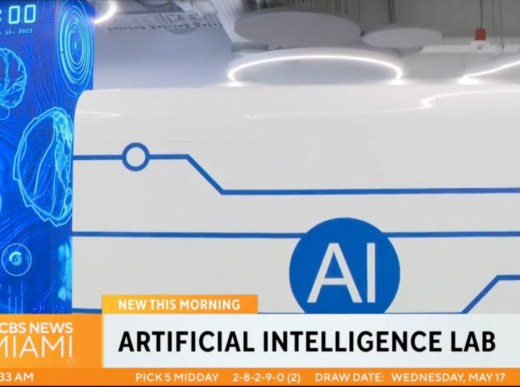Introduction
In today’s rapidly evolving technological landscape, Artificial Intelligence (AI) has emerged as a powerful tool with wide-ranging applications in various industries. From enhancing customer experiences to optimizing operational efficiency, AI has revolutionized the way businesses operate and compete in the modern world. This article explores the definition of AI and its applications in the business realm, highlighting its pivotal role in shaping the future of enterprises.
A. Definition of AI and its applications in business
AI can be broadly defined as the simulation of human intelligence in machines that are programmed to think and learn like humans. It encompasses various technologies, such as machine learning, natural language processing, computer vision, and robotics, among others. In the business domain, AI has found diverse applications across different sectors, including finance, healthcare, manufacturing, marketing, and customer service. Through advanced algorithms and data analysis, AI systems can analyze vast amounts of information, identify patterns, make predictions, and automate processes, leading to improved decision-making and operational efficiencies.
B. Importance of AI in shaping the future of businesses
The increasing adoption of AI technologies is transforming the business landscape and has become a key differentiator for organizations striving to gain a competitive edge. AI offers several advantages, such as enhanced productivity, cost savings, personalized customer experiences, and improved risk management. By leveraging AI, businesses can automate routine tasks, optimize workflows, and generate valuable insights from data, enabling them to make informed strategic decisions. Moreover, AI-powered solutions have the potential to unlock new business opportunities, drive innovation, and reshape entire industries.
C. Overview of the article’s main points
This article aims to delve deeper into the role of AI in the business world and its impact on organizations. It will explore various applications of AI across different functional areas, including marketing, operations, finance, and customer service. Additionally, the article will discuss the challenges and considerations associated with implementing AI in business contexts, such as ethical concerns, data privacy, and the need for human-AI collaboration. By examining these key aspects, this article seeks to provide valuable insights into the transformative power of AI and how businesses can harness its potential for sustainable growth and success in the future.
The Current State of AI in Business
A. Overview of AI adoption in various industries
Artificial Intelligence (AI) has witnessed widespread adoption across various industries, revolutionizing the way businesses operate. In the healthcare sector, AI-powered systems are enhancing diagnostics, drug discovery, and personalized patient care. Retail companies are leveraging AI algorithms to analyze consumer behavior and preferences, optimizing inventory management and targeted marketing campaigns. Financial institutions are utilizing AI for fraud detection, risk assessment, and algorithmic trading. Moreover, AI is being embraced in manufacturing, transportation, agriculture, and many other sectors, driving efficiency, productivity, and innovation.
B. Examples of successful AI implementations in businesses
Several businesses have successfully integrated AI technologies into their operations, yielding significant benefits. For instance, Amazon’s recommendation engine employs AI algorithms to provide personalized product suggestions to customers, boosting sales and customer satisfaction. Google’s search engine employs AI techniques to deliver more relevant search results, enhancing the user experience. In the healthcare industry, IBM’s Watson AI platform assists doctors in diagnosing and treating complex medical conditions, enabling faster and more accurate decision-making. These examples demonstrate how AI has transformed business processes and improved outcomes across diverse sectors.
C. Challenges and limitations of current AI technologies
Despite the progress made, AI still faces challenges and limitations. One major concern is the ethical implications of AI, such as bias in algorithms, privacy concerns, and job displacement due to automation. Ensuring transparency and fairness in AI decision-making processes remains an ongoing challenge. Additionally, the lack of interpretability of AI models poses difficulties in understanding how they arrive at their conclusions, hindering trust and accountability. The high cost of implementing and maintaining AI systems, as well as the shortage of skilled AI professionals, are also hurdles that businesses encounter. Moreover, AI technologies heavily rely on vast amounts of data, and issues related to data quality, security, and accessibility can hinder their effectiveness.

The Evolution of AI in Business
A. Advancements in AI technologies and algorithms
The evolution of AI in business has been driven by significant advancements in technologies and algorithms. Machine learning techniques, such as deep learning and reinforcement learning, have enabled AI systems to process and understand complex data patterns, leading to improved accuracy and performance. Natural Language Processing (NLP) has made substantial progress, enabling machines to comprehend and generate human language, facilitating applications like chatbots and voice assistants. Additionally, advancements in computer vision have empowered AI systems to interpret and analyze visual data, enabling applications like image recognition and object detection. These advancements have expanded the capabilities of AI and opened up new possibilities for businesses across industries.
B. Integration of AI into business processes and decision-making
AI has increasingly become integrated into business processes and decision-making, enhancing efficiency and effectiveness. Intelligent automation, powered by AI, is streamlining repetitive and mundane tasks, freeing up human resources for more strategic and creative endeavors. AI-driven analytics tools are providing businesses with actionable insights from large datasets, enabling data-driven decision-making and predictive analytics. Moreover, AI-powered recommendation systems are improving personalization and customer experiences, driving sales and loyalty. The integration of AI into areas such as supply chain management, customer service, and marketing is transforming the way businesses operate and enabling them to stay competitive in a rapidly evolving landscape.
C. Impact of AI on productivity and efficiency in businesses
The impact of AI on productivity and efficiency in businesses has been significant. AI technologies are capable of processing and analyzing vast amounts of data in real-time, enabling businesses to extract valuable insights and make faster, more informed decisions. Automation of repetitive tasks through AI systems reduces errors and increases operational efficiency, leading to cost savings and improved productivity. AI-powered predictive models and optimization algorithms help businesses optimize resource allocation, supply chain management, and production processes, resulting in improved efficiency and reduced waste. By augmenting human capabilities and enabling smarter decision-making, AI is transforming businesses by boosting productivity and driving operational excellence.

Key Benefits of AI in Business
A. Automation of repetitive tasks and increased productivity
One of the key benefits of AI in business is the automation of repetitive tasks, which leads to increased productivity. AI systems can handle mundane and time-consuming tasks, such as data entry, document processing, and customer support, freeing up human resources to focus on more strategic and complex activities. By automating these tasks, businesses can streamline their operations, reduce errors, and achieve higher efficiency. This automation not only saves time but also enables employees to utilize their skills and expertise in more valuable ways, ultimately driving productivity and overall organizational success.
B. Enhanced data analysis and insights for informed decision-making
AI enables businesses to extract valuable insights from large volumes of data and make informed decisions. AI algorithms can process and analyze vast amounts of data in real-time, uncovering patterns, trends, and correlations that humans may not easily detect. By leveraging AI-powered analytics tools, businesses can gain a deeper understanding of their customers, markets, and operations. This data-driven decision-making allows for more accurate predictions, better risk assessments, and improved strategic planning. Ultimately, the enhanced data analysis capabilities of AI empower businesses to make informed decisions that drive growth and competitive advantage.
C. Personalization and improved customer experience
AI plays a crucial role in delivering personalized experiences to customers. By leveraging AI algorithms, businesses can analyze customer data and behavior to tailor products, services, and recommendations to individual preferences. Personalized marketing campaigns, targeted recommendations, and customized user interfaces can significantly enhance the customer experience. AI-powered chatbots and virtual assistants also enable businesses to provide 24/7 support and respond to customer inquiries promptly. Through personalized interactions and seamless customer service, AI helps businesses build stronger relationships with their customers, drive customer satisfaction, and foster loyalty.
D. Streamlined operations and cost savings
AI can streamline business operations and generate cost savings. By automating manual and repetitive tasks, AI reduces the need for human intervention, minimizing errors and increasing operational efficiency. AI-powered systems can optimize processes such as inventory management, supply chain logistics, and production scheduling, leading to reduced waste and improved resource allocation. Moreover, AI can identify anomalies, inefficiencies, and areas of improvement within business operations, enabling businesses to implement targeted solutions and achieve cost savings. By streamlining operations and optimizing resource utilization, AI contributes to overall cost reduction and improved profitability.

Potential Applications of AI in the Future of Business
A. AI-powered customer service and chatbots
In the future of business, AI is poised to revolutionize customer service through the use of advanced chatbots and virtual assistants. AI-powered chatbots will become more intelligent, capable of understanding natural language and providing personalized responses to customer inquiries. These chatbots will handle a wide range of customer service tasks, such as order tracking, troubleshooting, and product recommendations, providing prompt and efficient support. By leveraging AI in customer service, businesses can enhance customer experiences, reduce response times, and improve overall satisfaction.
B. Predictive analytics and demand forecasting
AI’s potential in predictive analytics and demand forecasting is immense. Businesses will increasingly rely on AI algorithms to analyze vast amounts of data from various sources, including customer behavior, market trends, and historical sales data. These AI models will enable businesses to accurately forecast demand, optimize pricing strategies, and plan inventory levels. By leveraging predictive analytics, businesses can minimize stockouts, reduce excess inventory, and optimize their supply chain operations, ultimately improving efficiency and profitability.
C. Supply chain optimization and inventory management
AI will play a critical role in the future of supply chain management and inventory management. AI-powered systems will be able to analyze and optimize complex supply chain networks, taking into account factors such as transportation costs, lead times, and demand variability. By leveraging AI algorithms, businesses can optimize their inventory levels, reduce stockouts and overstocking, and improve order fulfillment. AI-driven supply chain optimization will lead to cost savings, improved customer satisfaction, and streamlined operations.
D. AI-driven marketing and personalized advertising
The future of business will witness AI’s significant impact on marketing and personalized advertising. AI algorithms will analyze vast amounts of customer data, including browsing behavior, purchase history, and demographic information, to create highly targeted marketing campaigns. AI-powered recommendation engines will deliver personalized product suggestions and tailored advertisements to individual customers, maximizing engagement and conversion rates. By leveraging AI-driven marketing strategies, businesses can enhance customer segmentation, improve customer targeting, and drive higher ROI on marketing investments.

Challenges and Considerations in Adopting AI in Business
A. Ethical considerations and responsible
AI practices As businesses adopt AI technologies, ethical considerations become crucial. AI algorithms can perpetuate biases or make decisions that have ethical implications. It is essential for businesses to ensure transparency, fairness, and accountability in AI decision-making processes. Responsible AI practices involve designing algorithms that minimize bias, protecting user privacy, and considering the potential social impact of AI implementations. Ethical frameworks and guidelines must be developed and adhered to, ensuring that AI is deployed in a manner that aligns with societal values and norms.
B. Data privacy and security concerns
The adoption of AI in business raises significant concerns regarding data privacy and security. AI systems heavily rely on vast amounts of data, and businesses must ensure that sensitive information is protected. Adequate measures should be implemented to secure data storage, transfer, and access. Additionally, businesses must comply with data protection regulations and establish protocols for handling personally identifiable information. Striking a balance between data collection for AI training and preserving individual privacy rights is a critical challenge that businesses need to address.
C. Workforce transformation and reskilling needs
The integration of AI into business processes has implications for the workforce. While AI automation can streamline operations and improve efficiency, it can also lead to job displacement. Businesses must consider the impact on their employees and invest in reskilling and upskilling programs. Transitioning to an AI-driven environment requires a shift in the skills and competencies of the workforce. Providing training opportunities and support for employees to adapt to new roles or acquire AI-related skills is essential to ensure a smooth workforce transformation and mitigate potential job displacement.
D. Regulatory and legal implications of AI in business
The adoption of AI in business is accompanied by regulatory and legal challenges. As AI technologies evolve, regulatory frameworks must keep pace to address concerns related to liability, accountability, and transparency. Businesses need to navigate complex legal landscapes and ensure compliance with regulations governing data usage, privacy, and algorithmic decision-making. Collaborative efforts between businesses, policymakers, and regulatory bodies are necessary to develop frameworks that balance innovation and protection, ensuring that AI is deployed responsibly and within legal boundaries.

Strategies for Successful AI Integration in Business
A. Identifying suitable use cases for AI implementation
To successfully integrate AI into business processes, it is crucial to identify suitable use cases that align with organizational goals and challenges. Businesses should assess areas where AI can provide the most value, such as automating repetitive tasks, optimizing decision-making, or improving customer experiences. By conducting a thorough analysis of existing workflows and pain points, businesses can pinpoint opportunities for AI integration. Careful consideration should be given to the feasibility, impact, and potential risks associated with each use case to prioritize implementation efforts effectively.
B. Collaboration between business and AI experts
Successful AI integration requires close collaboration between business stakeholders and AI experts. Business teams must work closely with AI specialists, data scientists, and technologists to understand the capabilities and limitations of AI technologies. By fostering a collaborative environment, businesses can ensure that AI solutions are aligned with specific business objectives and requirements. Regular communication and feedback loops between both parties are essential to drive successful AI integration, enabling a comprehensive understanding of business needs and technical capabilities.
C. Data collection, preparation, and quality assurance
Data plays a pivotal role in AI integration. Businesses must focus on effective data collection, preparation, and quality assurance processes. This involves identifying the relevant data sources, collecting and structuring data in a manner suitable for AI algorithms, and ensuring data quality and accuracy. Data privacy and security considerations should also be taken into account throughout the data lifecycle. Implementing robust data governance frameworks, establishing data quality standards, and leveraging data analytics tools can help businesses derive meaningful insights and maximize the effectiveness of AI implementations.
D. Continuous learning and improvement through feedback loops
AI integration in business is an iterative process that requires continuous learning and improvement. Businesses should establish feedback loops to gather insights from AI-driven processes and systems. Monitoring and evaluating AI performance, user feedback, and outcomes allow for ongoing refinement and optimization. This feedback-driven approach helps identify areas for improvement, enhances algorithm performance, and ensures that AI systems remain aligned with changing business needs. By prioritizing continuous learning and improvement, businesses can harness the full potential of AI technologies and drive sustainable business outcomes.

The Future of AI in Business
A. Predictions for AI advancements and business impact
The future of AI in business holds great promise for advancements and transformative impact. Predictions indicate that AI technologies will continue to advance rapidly, with breakthroughs in areas such as deep learning, natural language processing, and computer vision. These advancements will enable AI systems to perform complex tasks with increasing accuracy and efficiency. The impact on businesses will be far-reaching, with AI driving innovation, streamlining operations, and unlocking new opportunities for growth. From predictive analytics and personalized experiences to autonomous systems and intelligent automation, AI will reshape industries and redefine how businesses operate.
B. Emerging trends in AI technologies and applications
Emerging trends in AI technologies and applications will shape the future landscape of business. Explainable AI will gain prominence, focusing on improving transparency and interpretability of AI algorithms, which will be crucial for building trust and understanding AI decision-making processes. AI-powered robotics and automation will continue to advance, transforming industries such as manufacturing, logistics, and healthcare. Edge computing and edge AI will gain traction, enabling real-time data processing and decision-making at the edge of the network. Additionally, AI applications in areas like healthcare, cybersecurity, and climate change will become more prevalent, addressing critical global challenges.
C. Potential challenges and opportunities for businesses
While the future of AI in business offers immense opportunities, it also presents challenges that need to be addressed. Ethical considerations surrounding AI, including bias, privacy, and accountability, will require ongoing attention. Businesses must navigate the potential impact on the workforce, ensuring that AI integration is accompanied by reskilling and upskilling initiatives to empower employees in the digital era. Moreover, businesses will need to stay informed about evolving regulations and legal frameworks pertaining to AI to ensure compliance. Successfully harnessing the potential of AI requires strategic planning, effective change management, and a proactive approach to addressing these challenges.
Conclusion
A. Recap of key points discussed in the article
In conclusion, this article explored the future of AI in business, highlighting predictions for AI advancements and its impact on businesses. We discussed emerging trends in AI technologies and applications, such as explainable AI, robotics, and edge computing. Furthermore, we examined potential challenges and opportunities, including ethical considerations, workforce transformation, and regulatory compliance.
B. Importance of embracing AI for future business success
Embracing AI is essential for future business success. The rapid advancement of AI technologies offers businesses the opportunity to gain a competitive edge, drive innovation, and unlock new levels of efficiency and productivity. By leveraging AI’s capabilities, businesses can improve decision-making, personalize customer experiences, optimize operations, and drive sustainable growth in an increasingly digital and data-driven world.
C. Call to action for businesses to explore AI opportunities
In light of the significant potential AI offers, businesses are encouraged to explore AI opportunities and develop strategies for its integration. This involves identifying suitable use cases, fostering collaboration between business and AI experts, investing in data quality and governance, and embracing continuous learning. By embracing AI strategically and responsibly, businesses can position themselves at the forefront of innovation, seize competitive advantages, and shape a successful future in the rapidly evolving business landscape.














